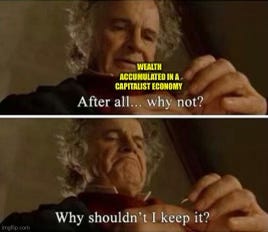Neiman Marxists: A Critique
Bernie Sanders is angry about capitalism and material inequality. He’s also a multimillionaire who doesn’t donate much to charity. At first blush, this looks hypocritical. If, by his own admission, Bernie has too much and others have too little, shouldn’t he transfer some of his surplus to those who need it more?
But maybe things aren’t so simple. A defender of Bernie and other champagne socialists could reply as follows: “Socialists are making claims about policy, not personal behavior. They want the state to do more redistribution from the rich to the poor and this is consistent with the idea that an individual rich person isn’t obligated to voluntarily redistribute their surplus to the poor. I’m not obligated to do something just because the state is obligated to do that thing.”
This style of argument is sometimes convincing. In particular, it works in two sorts of cases. In the first sort of case, complying with a rule would put you at an unfair disadvantage if others aren’t complying as well. Maybe you run an NFL team and you think the salary cap should be lower. Until the salary cap is actually lowered and your competition complies, you’re under no obligation to spend less—that would put you at an unfair disadvantage. Similarly, a politician could support limits on large private campaign contributions but nevertheless accept such contributions until those limits are actually in place.
This argument doesn’t apply to the case of the Neiman Marxist, however. Helping the poor isn’t a competition. Imagine you come across the proverbial shallow pond, this time with several drowning children. You ought to wade in and save as many children as you can, even if others don’t do the same. No decent person would refuse to wade in on the grounds that ruining their clothes would put them at an “unfair disadvantage” relative to those who didn’t save any drowning children. If you’re a multimillionaire and can alleviate some people’s poverty, you should do so even if you end up with less money than others who aren’t so altruistic.
The second sort of case concerns collective action problems where your individual action is inconsequential. You might want to have an expensive neighborhood-wide fireworks show, but your individual contribution won’t make a meaningful difference. You need everyone to contribute to make it happen. Here you’re probably not obligated to help pay for the show unless your neighbors chip in as well. So you may advocate for a rule that requires everyone to pay without being obligated to pay unless the rule is passed.
But poverty alleviation isn’t like this case either. While it’s true that an individual donation will not make a meaningful difference to the national or global distribution of income, it will make a difference to particular people in poverty. That you cannot alleviate the poverty of all is not a reason to refuse to alleviate the poverty of some. In the poverty case, but not the fireworks case, your individual contribution does make a difference on its own.
I’d say that the duty to redistribute income is more like the duty to not commit fraud. Suppose there were no legal restrictions against fraud. Bill argues for such restrictions partly on the grounds that fraud violates the rights of the defrauded parties. However, Bill commits fraud in own life. He couldn’t plausibly defend himself by saying that he’s only making arguments about institutions and not individual behavior. Why not? Because the reason in favor of the legal restriction against fraud—namely, that it violates the rights of the defrauded party—is also a reason for an individual not to commit fraud.
Now suppose, as is plausible, that the reason to redistribute from the rich to the poor is that the poor need that income more than the rich. If you’re a particular rich person, then a particular poor person needs your surplus income more than you do. So the reason that speaks in favor of state-enforced redistribution also speaks in favor of individual redistribution.
(For more on these arguments and others, check out this article that Jason Brennan and I wrote for Reason.)



